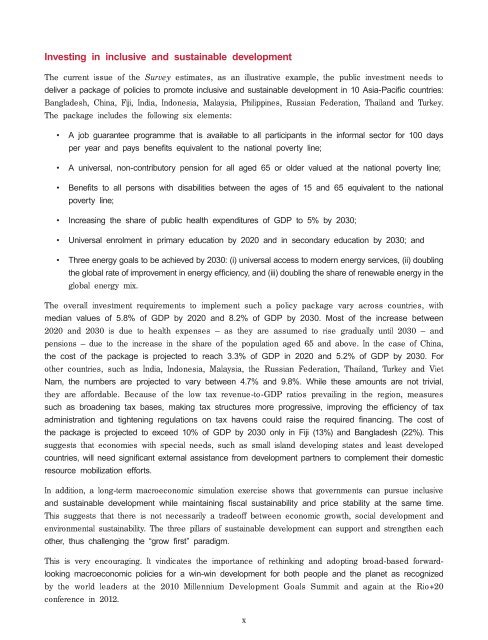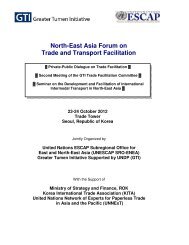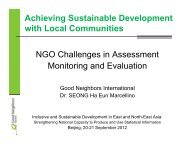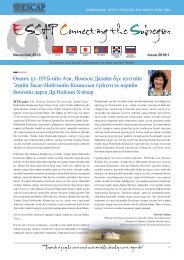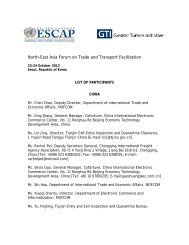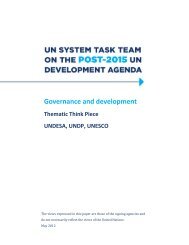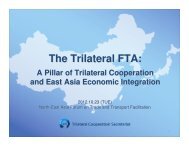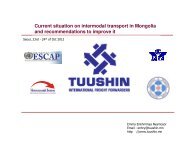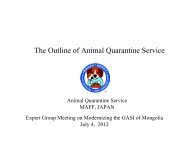Full Report - Subregional Office for East and North-East Asia - escap
Full Report - Subregional Office for East and North-East Asia - escap
Full Report - Subregional Office for East and North-East Asia - escap
You also want an ePaper? Increase the reach of your titles
YUMPU automatically turns print PDFs into web optimized ePapers that Google loves.
Investing in inclusive <strong>and</strong> sustainable development<br />
The current issue of the Survey estimates, as an illustrative example, the public investment needs to<br />
deliver a package of policies to promote inclusive <strong>and</strong> sustainable development in 10 <strong>Asia</strong>-Pacific countries:<br />
Bangladesh, China, Fiji, India, Indonesia, Malaysia, Philippines, Russian Federation, Thail<strong>and</strong> <strong>and</strong> Turkey.<br />
The package includes the following six elements:<br />
• A job guarantee programme that is available to all participants in the in<strong>for</strong>mal sector <strong>for</strong> 100 days<br />
per year <strong>and</strong> pays benefits equivalent to the national poverty line;<br />
• A universal, non-contributory pension <strong>for</strong> all aged 65 or older valued at the national poverty line;<br />
• Benefits to all persons with disabilities between the ages of 15 <strong>and</strong> 65 equivalent to the national<br />
poverty line;<br />
• Increasing the share of public health expenditures of GDP to 5% by 2030;<br />
• Universal enrolment in primary education by 2020 <strong>and</strong> in secondary education by 2030; <strong>and</strong><br />
• Three energy goals to be achieved by 2030: (i) universal access to modern energy services, (ii) doubling<br />
the global rate of improvement in energy efficiency, <strong>and</strong> (iii) doubling the share of renewable energy in the<br />
global energy mix.<br />
The overall investment requirements to implement such a policy package vary across countries, with<br />
median values of 5.8% of GDP by 2020 <strong>and</strong> 8.2% of GDP by 2030. Most of the increase between<br />
2020 <strong>and</strong> 2030 is due to health expenses – as they are assumed to rise gradually until 2030 – <strong>and</strong><br />
pensions – due to the increase in the share of the population aged 65 <strong>and</strong> above. In the case of China,<br />
the cost of the package is projected to reach 3.3% of GDP in 2020 <strong>and</strong> 5.2% of GDP by 2030. For<br />
other countries, such as India, Indonesia, Malaysia, the Russian Federation, Thail<strong>and</strong>, Turkey <strong>and</strong> Viet<br />
Nam, the numbers are projected to vary between 4.7% <strong>and</strong> 9.8%. While these amounts are not trivial,<br />
they are af<strong>for</strong>dable. Because of the low tax revenue-to-GDP ratios prevailing in the region, measures<br />
such as broadening tax bases, making tax structures more progressive, improving the efficiency of tax<br />
administration <strong>and</strong> tightening regulations on tax havens could raise the required financing. The cost of<br />
the package is projected to exceed 10% of GDP by 2030 only in Fiji (13%) <strong>and</strong> Bangladesh (22%). This<br />
suggests that economies with special needs, such as small isl<strong>and</strong> developing states <strong>and</strong> least developed<br />
countries, will need significant external assistance from development partners to complement their domestic<br />
resource mobilization ef<strong>for</strong>ts.<br />
In addition, a long-term macroeconomic simulation exercise shows that governments can pursue inclusive<br />
<strong>and</strong> sustainable development while maintaining fiscal sustainability <strong>and</strong> price stability at the same time.<br />
This suggests that there is not necessarily a tradeoff between economic growth, social development <strong>and</strong><br />
environmental sustainability. The three pillars of sustainable development can support <strong>and</strong> strengthen each<br />
other, thus challenging the “grow first” paradigm.<br />
This is very encouraging. It vindicates the importance of rethinking <strong>and</strong> adopting broad-based <strong>for</strong>wardlooking<br />
macroeconomic policies <strong>for</strong> a win-win development <strong>for</strong> both people <strong>and</strong> the planet as recognized<br />
by the world leaders at the 2010 Millennium Development Goals Summit <strong>and</strong> again at the Rio+20<br />
conference in 2012.<br />
x


